

Encanto Reo Māori hits cinemas across the motu on Thursday, 12 September 2024.
Photo/Supplied
‘The world is yours’: Encanto Reo Māori hits cinemas this week
The fifth installment of Disney’s Māori language films is set for release in Aotearoa New Zealand.


Pull of The Rock: ‘Descendants of Niue’ reclaim and reconnect with home and heritage

Niue PM calls for Realm leaders to discuss constitutional ties

‘Words have power’: Pacific tolerance for on-air slurs hits record low

Auckland Council lifts flood mitigation cap to avoid costly buyouts

Pull of The Rock: ‘Descendants of Niue’ reclaim and reconnect with home and heritage

Niue PM calls for Realm leaders to discuss constitutional ties

‘Words have power’: Pacific tolerance for on-air slurs hits record low
For many Māori millennials who grew up in the OG 2D Disney era, seeing and hearing our reo on screen was like finding a needle in a haystack.
Te reo Māori was often reserved for serious documentaries or formal interviews.
Today, the upcoming generation has a growing pool of Disney films that have been translated into te reo Māori including Moana, Lion King, Frozen, Coco, and just last night the Colombian-centred story of Encanto premiered in Tāmaki Makaurau Auckland.
Parents and their tamariki travelled from all over the North Island to the Civic Theatre in Auckland’s CBD, to be among the first in the country to celebrate yet another fantastic milestone for te reo Māori.
Making her debut, Te Waimarie Ngatai-Callaghan voices the quirky female lead, Mirabel Madrigal.
She says the latest iteration of Disney Reo Māori animation is essential “for our babies’.
“It’s very vital for our reo Māori to be heard, for our babies to keep speaking our te reo Māori, ahakoa nō hea, kei hea, ko wai koe, āe, ko te reo Māori - No matter where you’re from, where you are, or who you are, te reo Māori always.”
Disney Reo Māori are produced locally in Aotearoa by multi-media organisation Matewa Media whose goal is to “contribute to te reo Māori, culture, and indigenous stories”.
Visionaries, producers, and directors Tweedie Waititi, Chelsea Winstanley, and Mia Henry-Teirney, along with musical director Pere Wihongi bring Encanto Reo Māori to the big screen nationwide just in time for Te Wiki o Te Reo Māori.
Presenter Marcia Hopa and Musician Awatea Wihongi together carry the dialogue and vocals of the viraginous Luisa Madrigal, who both agree that these films encourage Māori representation in a “positive light”.
“Our kids of today get to see people like them, their own people as characters and they get to dream of it and one day become it,” says Hopa.
“It’s an awesome world to wake up and their world is te ao Māori.”
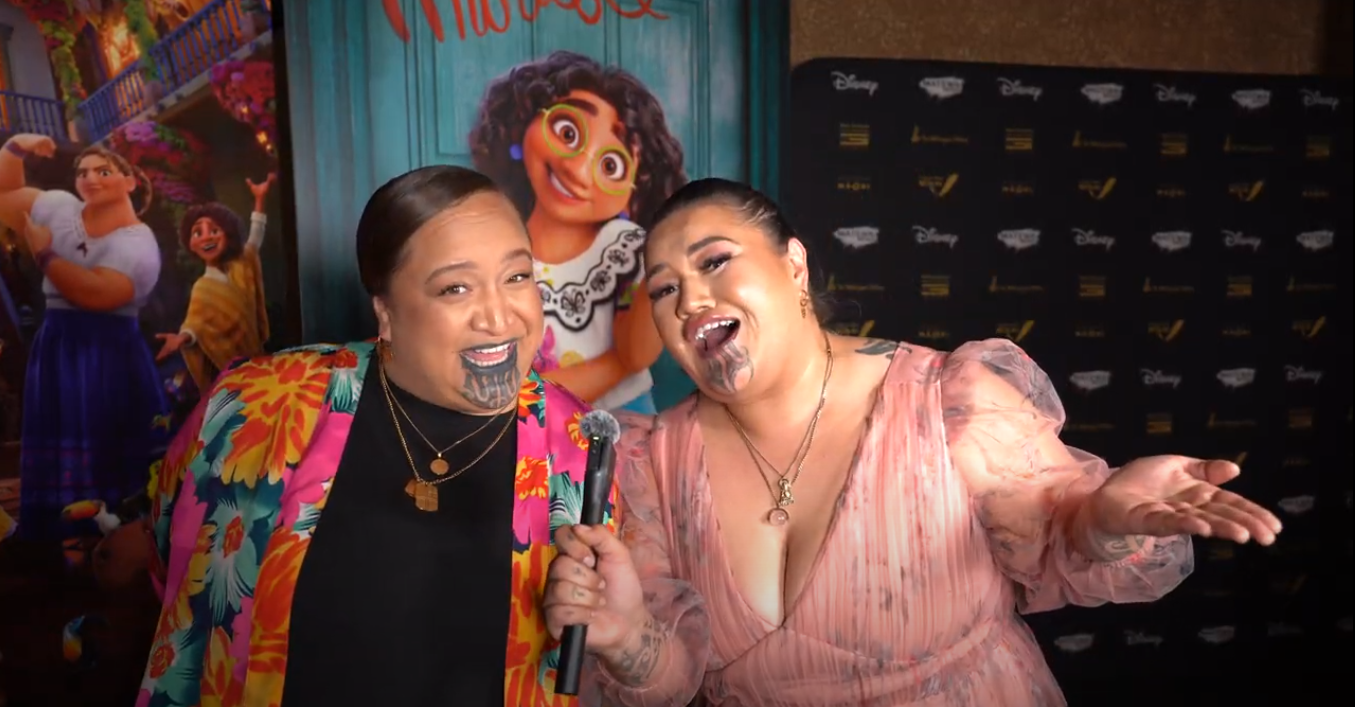
Luisa Madrigal's dialogue is by Marcia Hopa (left) and singing vocals by Awatea Wihongi. Photo/Supplied
Before Tuesday night’s showing, a special announcement was made that the next Disney Reo Māori animated film will be Moana 2.
Wihongi believes this generation is “lucky because they only know Māori Disney”.
“When I was growing up I absolutely loved Disney and there wasn’t any Māori movies at all, so being able to bring this out for our tamariki it’s amazing, it’s great.
“And to have them singing te reo Māori and be proud to see their whānau, to hear their aunties on the screen, it’s an absolutely amazing feeling.”
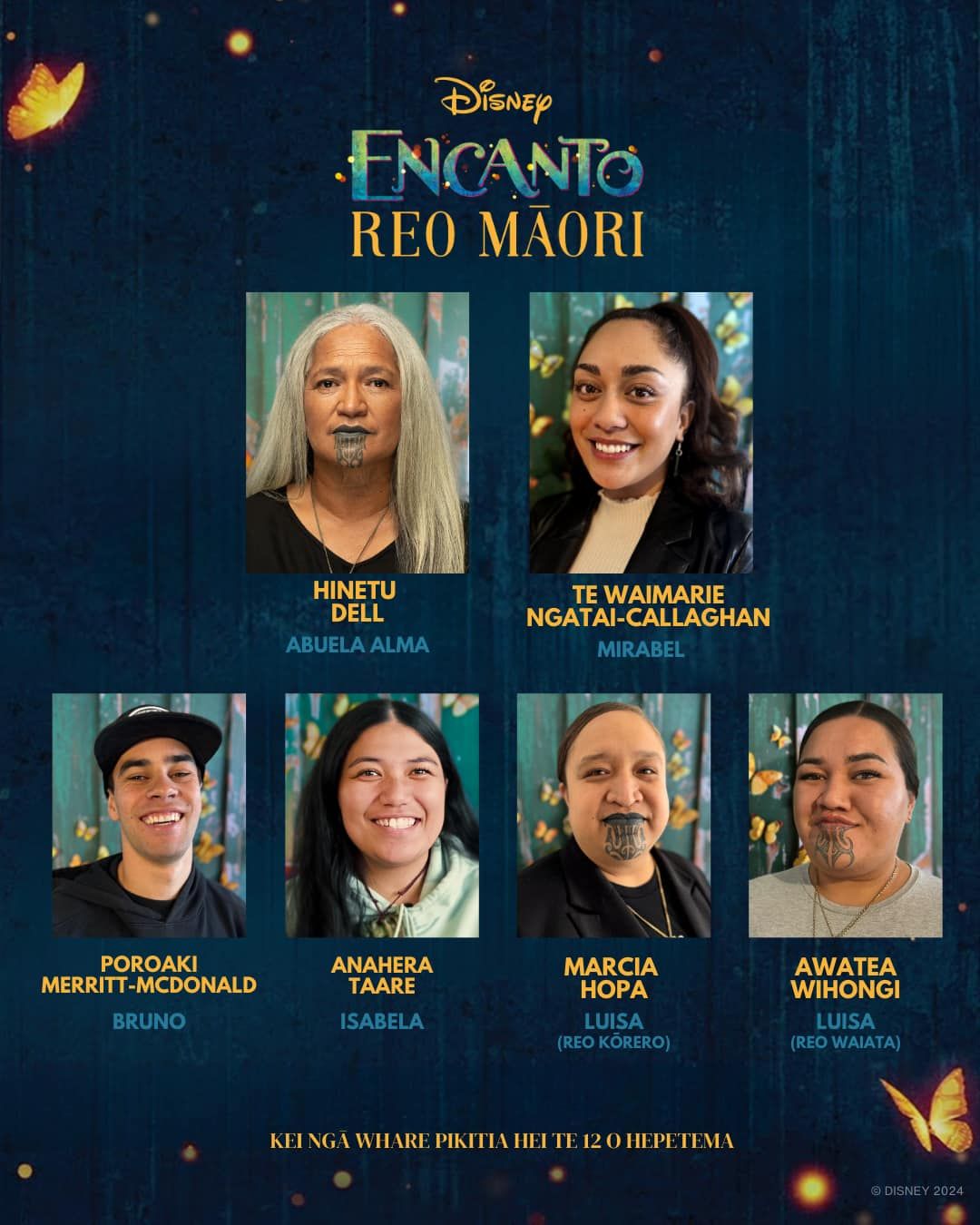
Photo/Disney Reo Māori
Translations for the film were done by renowned Mātanga Reo, Pānia Papa and Leon Blake. And unlike some of the previous Disney Reo Māori films, Encanto is less focused on a particular mita (dialect), it aims to connect as many people to te reo Māori as possible.
Colombian consultant, Mauricio Lozano, hailing from the Amazon, and multilinguist Hana Mereraiha, ensured the Spanish language is honoured throughout the film.
The character of the omniscient cousin, Dolores, is played by singer and actor Awimai Fraser (Frozen Reo Māori, Ahikaaroa, Toi Time), who is hapū (pregnant) with her son.
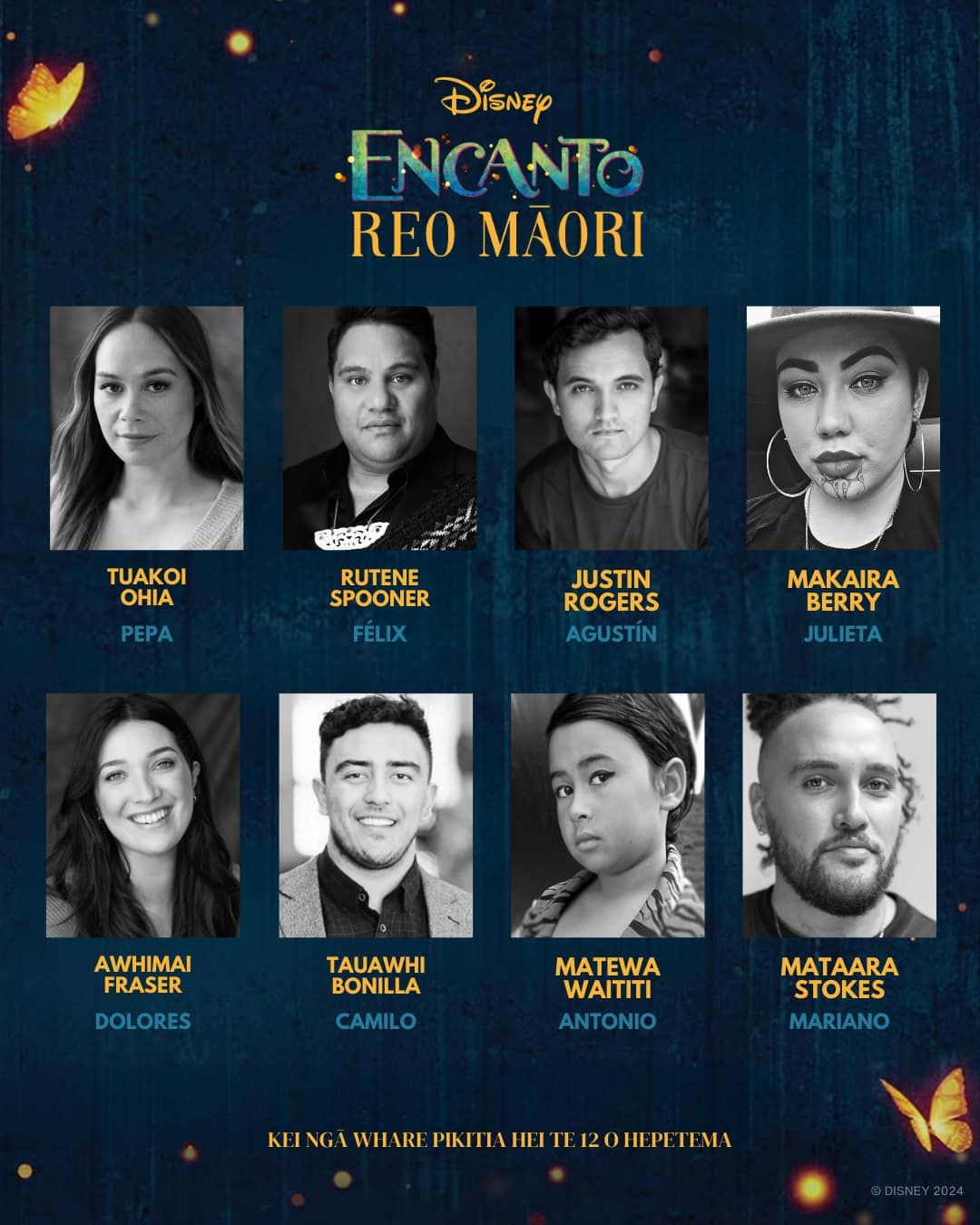
Photo/Disney Reo Māori
She says executing the on-screen vision comes down to shared “trust” behind-the-scenes.
“It’s about first of all trusting our team that they’ve put together a beautiful script for us and beautiful kupu to waiata.
“And trusting that we are safe and held, you know, ā-wairua, ā-tinana, ā-hinengaro, ā-ngākau hoki - spiritually, physically, mentally, and in soul.
“I think that makes the challenges more of a whānau effort and we just have to mirimiri (massage) it out as a team.”
Musician and composer Makaira Berry and actor Justin Rogers stepped in to voice Mirabel’s parents Julieta and Agustìn, while actor Mataara Stokes (The Lion King Reo Māori, Ahikaaroa), plays the village heartthrob Mariano Guzmán.
Returning to the Matewa Media whānau are actors Tuakoi Ohia and Rutene Spooner (Frozen Reo Māori) as the weather manipulator Pepa Madrigal and her husband Félix. Matewa Waititi (Coco Reo Māori) voices youngest cousin, Antonio. Tauawhi Bonilla takes on the role of the shapeshifting Camilo.
Ohia says the animation film industry is an opportunity for te reo Māori to be platformed “worldwide mainstream”.
“I think it’s a testament to the things that we probably thought were impossible but are possible.”
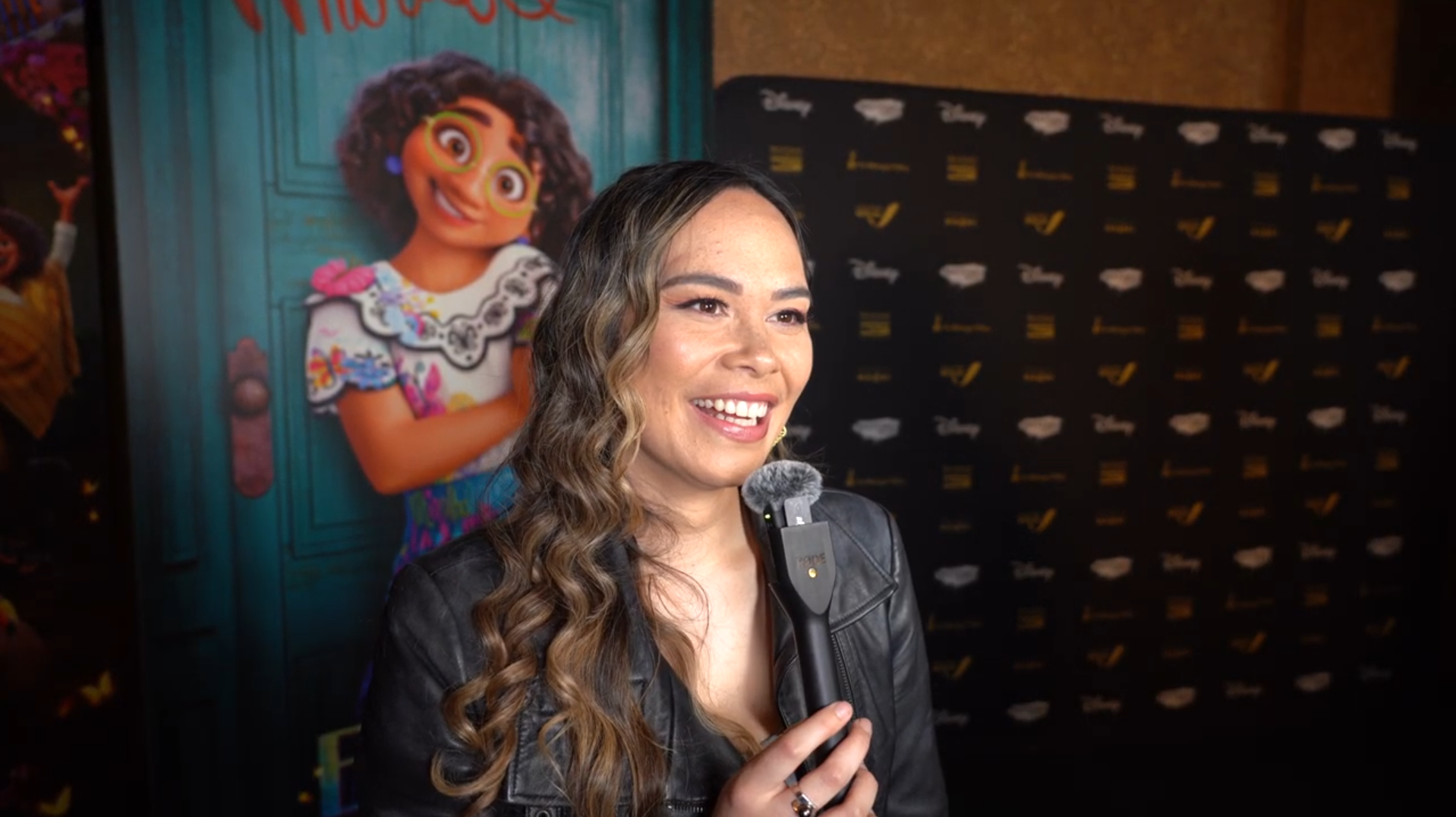
Tuakoi Ohia voices Tia Pepa Madrigal. Photo/Supplied
Voice overs were done individually, the only time the cast was together was during song rehearsals, so the voice actors drew from personal experience and real-life parallels to give mana to their roles.
Another newcomer joining the list of rangatahi sustaining te reo Māori is Anahera Taare (Ka Hao) who says she resonates with her role as the “perfectionist” Isabella.
“We also have high expectations in our family to succeed. E tino rongo ana ahau i tōna wairua ki roto i ērā ahuatanga - I really resonate with her in that aspect.”
Playing the estranged uncle Bruno is Poroaki Merrit-McDonald who says he is stepping into foreign but welcomed territory with this role.
“It was such a challenge for me because for most of my acting career I’ve just been the ‘hori Māori boy’.
“As a kid you always watched Disney people doing that Disney thing,” he says while imitating the drawing motions of the “Mickey ears” childhood Disney actors would do for their show promos on Disney Channel.
“You always wanted to do that but for me this is ten times better ‘coz I’m doing it in my own language and for my own people.”
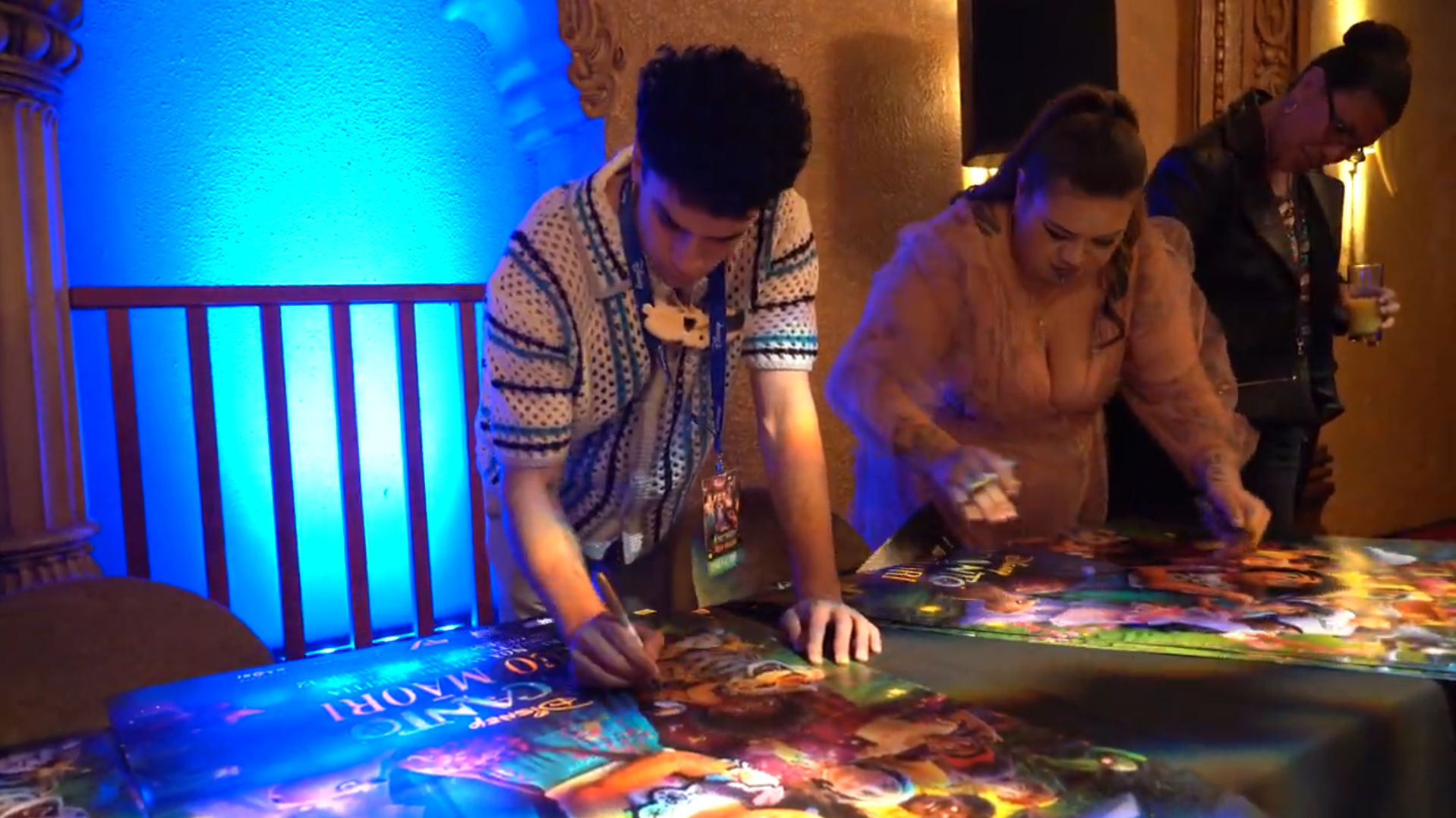
Poroaki Merrit-McDonald (left) and Awatea Wihongi signing posters with Pānia Papa (background)
The maternal epicentre of the Madrigal whānau is Abuela Alma, played by Haka exponent and actor Hinetu Dell (Vai, Koka).
At 76 years old, Dell says this is “the last place” she expects to see herself in but that she and her character are cut from the same cloth.
“My own experiences in terms of singing, kapa haka, composition, writing songs, all those experiences enhanced my ability to be able to confront Abuela’s character.”
“Lots of similarities, basically we are the same, we’re from the same whānau, we have the same protocols.”
Dell says as an elder in the film industry, her role is to help create opportunities for the future generation.
“There are so many opportunities in the film world, in front of the camera, behind the camera, all of that. It’s up to them, just go for it, the world is yours.”
Encanto Reo Māori will be in cinemas nationwide from 12 September 2024 - check screenings here.